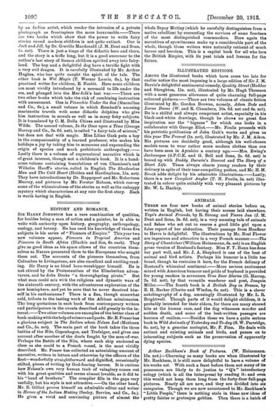HISTORY AND ROMANCE.
SIR HARRY JOHNSTON has a rare combination of qualities, for besides being a man of action and a painter, he is able to write with authority upon history, geography, anthropology, zoology, and botany. He has used his knowledge of these five subjects in his series of "Pioneers of Empire." This year two new volumes appear, Pioneers in Tropical America and Pioneers in South Africa (Blackie and Son, 6s. each). They give as good ideas as his space allows of the countries them- selves as Nature presented them to the Europeans who sought them out. The accounts of the pioneers themselves, from Columbus to Livingstone, are also excellent and exciting read- ing. Sir Harry is no blind hero-worshipper himself. He is not stirred by the Protestantism of the Elizabethan adven- turers, and he dubs Drake "a thoroughgoing pirate." But what man could mix with the religions and dynastic wars of the sixteenth century, with the adventurous exploration of the new hemisphere, and yet be sure that he never deceived him- self in his enthusiasms P There is a fine, though somewhat cold, tribute to the lasting work of the African missionaries. The long quotations in each book from contemporary writers and participators in the events described add greatly to the in- terest.—Two other volumes are examples of the better class of book-making with the help of scissors and paste. Mr. E. Fraser has a glorious subject in The Sailors whom Nelson Led (Methuen and Co., 5s. net). The main part of the book takes the three battles of the Nile, Copenhagen, and Trafalgar, and gives one account after another of the duels fought by the men-of-war. Perhaps the Battle of the Nile, where each ship anchored as close as she could to a French vessel, is the most vividly described. Mr. Fraser has collected an astonishing amount of narrative, written in letters and otherwise by the officers of the fleet—wonderfully straightforward and dignified, occasionally stilted, pieces of writing by God-fearing heroes. It is curious how Nelson's own very human trait of vainglory comes out with his great qualities and seems almost lovable, as it did to his "band of brothers." The compiler fills in the gape very usefully, but his style is not attractive.—On the other hand, Mr. E. Gilliat proves himself an admirable editor and writer in Heroes of the Indian Mutiny (Seeley, Service, and Co., 5s.). He gives a vivid and convincing picture of almost the whole Sepoy Mutiny (which he carefully distinguishes from a native rebellion) by recounting the services of some fourteen of the most distinguished commanders. Here again the narratives of eyewitnesses make up a considerable part of the whole, though these writers were naturally reticent of much horror and heroism. This is a capital book for all who love the British Empire, with its past trials and lessons for the future.










































 Previous page
Previous page